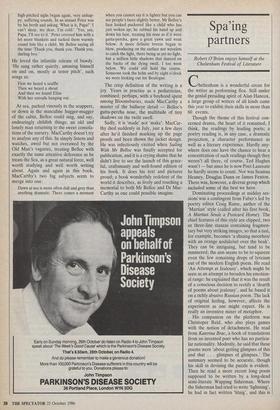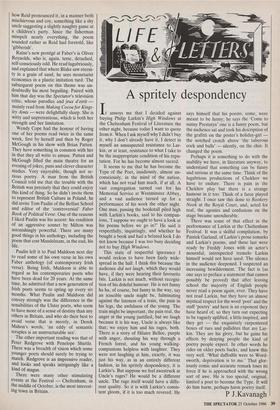Spa'ing partners
Robert O'Brien enjoys himself at the Cheltenham Festival of Literature Cheltenham is a wonderful circus for the writer as performing flea. Still under the genial presiding spirit of Alan Hancox, a large group of writers of all kinds came this year to exhibit their skills in more than 60 events.
Though the theme of this festival con- cerned drama, the heart of it remained, I think, the readings by leading poets; a poetry reading is, in any case, a dramatic projection, a character performance as well as a literary experience. Hardly any- where does one have the chance to hear a concentration of such readings though they weren't all there, of course. Ted Hughes wasn't — but since he is now Poet Laureate he hardly seems to count. Nor was Seamus Heaney, Douglas Dunn or James Fenton. There was, however, a diverse group which included some of the best we have.
Dominating proceedings at midday ses- sions was a contingent from Faber's led by poetry editor Craig Raine, author of the 'Martian' style (called after his first book, A Martian Sends a Postcard Home). The chief features of this style are clipped, two or three-line stanzas containing fragmen- tary but very striking images, so that a taxi, for example, becomes 'a shining moorhen/ with an orange nodule/set over the beak'. They can be intriguing, but tend to be mannered; the aim seems to be to squeeze even the few remaining drops of lyricism out of the modern English poem. He read 'An Attempt at Jealousy', which might be seen as an attempt to broaden his emotion- al range: he explained that it was the result of a conscious decision to rectify a 'dearth of poems about jealousy', and he based it on a richly abusive Russian poem. The lack of original feeling, however, affects the experiment as one might expect. He is really an inventive mixer of metaphor.
His companion on the platform was Christoper Reid, who also plays games with the notion of detachment. He read from Katerina Brac, a book of translations from an invented poet who has no particu- lar nationality. Modestly, he said that these poems were 'about getting glimpses of this and that . . . glimpses of glimpses.' The summary seemed to be accurate, though his skill in devising the puzzle is evident. Then he read a more recent long poem supposed to be written by a long-dead semi-literate Wapping fisherman. Where the fisherman had tried to write 'lightning', he had in fact written litnig', and this is how Reid pronounced it, in a manner both mischievous and coy, something like a shy uncle suggesting a slightly naughty game at a children's party. Since the fisherman misspelt nearly everything, the poem sounded rather as Reid had foretold, like 'gibberish'.
Raine's new protege at Faber's is Oliver Reynolds, who is, again, terse, detached, self-consciously odd. He read lugubriously, and explained that where Blake saw eterni- ty in a grain of sand, he sees monetarist economics in a plastic imitation turd. The subsequent poem on this theme was un- doubtedly his most beguiling. Paired with him that day was the Spectator's television critic, whose parodies and jeux d'esrit — mainly read from Making Cocoa for Kings- ley Anus — were delightfully sharp. She is witty and unpretentious, which is both her strength and her limitation.
Wendy Cope had the honour of having one of her poems read twice in the same week, first by herself and then by Roger McGough in his show with Brian Patten. They have something in common with her in that they all write to amuse. Patten and McGough filled the main theatre for an evening of jokes, puns and clever character studies. Very enjoyable, though not se- rious poetry. A man from the British Council told me that the trouble with the British was precisely that they could enjoy this kind of thing. So he didn't invite them to represent British Culture in Poland, he did invite Tom Paulin of the Belfast School and editor of the 'controversial' Faber Book of Political Verse. One of the reasons I liked Paulin was his accent: his rendition of an aggressive sonnet by Milton was astonishingly powerful. There are many good things in his anthology, including the poem that cost Mandelstam, in the end, his life.
Paulin left it to Paul Muldoon next day to read some of his own verse in his own Faber anthology (of contemporary Irish verse). Being Irish, Muldoon is able to regard as his contemporaries poets who have been dead for 20 years. At the same time, he admitted that a new generation of Irish poets seems to spring up every six months. What Paulin and Muldoon did convey strongly was the difference in the sensibilities of the Ulster poets, who seem to have more of a sense of destiny than any others in Britain, and who do their best to avoid verse that is merely, in Derek Mahon's words, 'an eddy of semantic scruples is an unstructurable sea'.
The other important reading was that of Peter Redgrove with Penelope Shuttle. There was a breadth of vision which some younger poets should surely be trying to match. Redgrove is an impressive reader, and looks and speaks intriguingly like a kind of magus.
There were many other stimulating events at the Festival — Cheltenham, in the middle of October, is the most interest- ing town in Britain.



























































 Previous page
Previous page